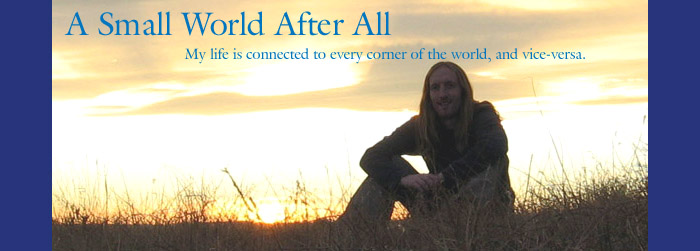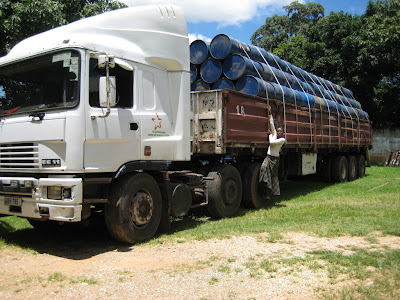Lunch time always consists of chit-chat, or actually, a better description would be gossip. We eat nshima, which is a porridge like corn meal, and this is accompanied by some sort of fish or meat and one vegetable cooked in oil (such as pumpkin leaves).
I am always the last to finish even though I eat the least amount. I carefully chew on every ounce of food, the rest of the guys and girls swallow nshima almost like jello.
More than half the time the conversation is in Lunda, so I have a hard time following the intricacies of the conversation. Partly I feel the guys get tired of speaking English at work, and partly I feel they want me to catch onto Lunda and this is my chance to learn.
Today Chris decided to eat with us, normally he goes home to eat with his wife Lisette. Chris has emphasized English within the company for 7 years - so when he's around the conversation always flows in English, and today the gossip was kicked off by the mention of a funeral, and that funeral was due to a young guy being HIV positive. As usual, there was no official mention at the funeral about the person being positive, instead they are understood to have died of some illness….maybe malaria, maybe TB or just anything else. A sad twist to this funeral was that the boy was only 15 - and his parents had died long ago, so chances are that he was born with HIV and he may have never even of known it. Imagine the confusion at the age of 14 when you start losing weight and feeling unlike yourself, then it just gets worse and worse….
The conversation was then fuelled by the relation between drinking and promiscuous late night activity. A very intelligent, hard working young guy at work was caught drunk last Saturday when he showed up to work saying he had to do a job and borrowed the motorbike only to wipe out. This person is very well trusted and I consider him a friend - yet a few drinks led him to risking his job and injuring himself.
Then there was another story of a person who is well respected who started drinking and everyone knows they are HIV positive….and we talked about the local "guesthouse" which is like a cheap motel, or hostel. Truth is - it’s a full blown brothel for soldiers, truck drivers and many others. We talked about a song that a local musician made - where they sing about a government guesthouse which is also known to have sex workers 'servicing' the guests.
Before I knew it the gossip went from one person to another about who you knew that was HIV positive, and how they got that way, and about all the children these people will leave behind before long - about how some women, when they don’t have a strong man in their life, will pass the children to their mothers to raise. A full half hour went by and I became a bit frozen, the guys would laugh once in a while when they talked about a certain person many of them know - I guess its hard to condemn something that is so prevalent and depressing - so laughing helps a bit, not laughing at the persons situation or anything like that, but just laughing at the ridiculous simplicity of it. HIV comes to those who fool around and don’t use a condom, everyone knows it, yet 40% of adults in Mwinilunga have it.
And there is zero mention of ARV's to keep people alive once they have it. (It was announced a couple years back that Anti-retrovirals are free in Zambia, but I figure its just free in the big cities)
Now I sit and type on my computer and I still feel frozen, numb. The weight of the situation is incredible and I don’t know what to do about it.
People make logical decisions, and based on a given persons reality, one may choose to risk contracting HIV. Everyone knows how you get HIV, and everyone knows how to stop it - you can preach ABC (or just AB if you're the pope!) for an eon but it wont change the fact that underlying the disease is a persons belief that their future is not worth much. At least not worth enough to never risk getting HIV.
How can this change? How can a person in Zambia believe in a good future?

















